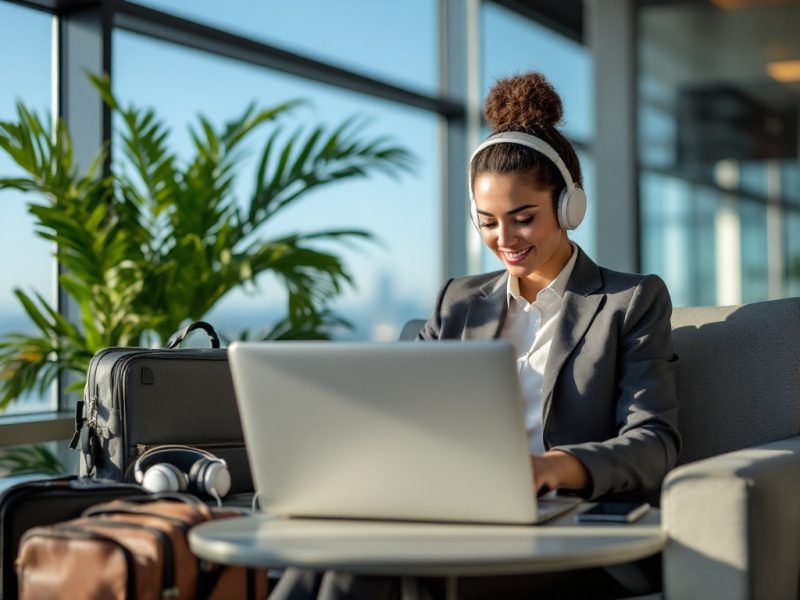Overcoming Anxiety: Preparing for Your First Business Trip
Dread your first business trip? Travel anxiety, or hodophobia, is surprisingly common, marked by insomnia, nausea, and obsessive planning. This article reveals how to pinpoint your anxiety triggers, from fear of flying to navigating new cities, and offers practical solutions. Learn relaxation techniques, efficient packing strategies, and coping mechanisms to transform your first business trip into a successful and stress-free experience. Start planning your confident journey today!
Important information

- Travel anxiety, especially on first business trips, is common. It can have physical symptoms (like nausea and insomnia) and behavioral changes (such as over-planning).
- Common triggers include fear of flying, unfamiliar places, work pressures, and being away from family. Identifying your specific triggers is crucial for managing anxiety.
- Careful planning, efficient packing, and relaxation techniques (like deep breathing and meditation) are key to reducing stress.
- Creating a personalized anti-anxiety toolkit with comforting items (like a favorite blanket or calming scents) can help manage anxiety during the trip.
- Reflecting on past trips helps identify stressors and effective coping strategies, improving future travel experiences. If anxiety is severe, seek professional help.
Understanding Travel Anxiety on Your First Business Trip
Traveling for work, especially for the first time, can be intimidating. This travel anxiety, sometimes called hodophobia, is quite common and can manifest in both emotional and physical ways. Recognizing these signs is the first step to managing them. Common triggers include a fear of flying and the stress of navigating unfamiliar places. Many also worry about leaving family and friends, coupled with the pressures of presentations, networking, and other work obligations. Identifying the root of your anxiety is key. Are you afraid of the unknown, or do specific travel logistics cause you concern? Once you pinpoint the cause, you can develop effective coping mechanisms. Careful planning, packing efficiently, and practicing relaxation techniques can significantly reduce anxiety and contribute to a successful business trip.
Recognizing Symptoms of Travel Anxiety
Pre-travel jitters can cause genuine stress, manifesting in physical symptoms like insomnia, nausea, muscle tension, headaches, and fluctuating appetite. You might also exhibit behavioral changes such as pacing, fidgeting, irritability, obsessively checking itineraries, or meticulously over-planning. Identifying these signs is the first step towards managing your pre-trip anxiety. These symptoms can be grouped into two main categories:
Physical Symptoms
- insomnia,
- nausea,
- muscle tension,
- headaches,
- fluctuating appetite.
Behavioral Changes
- pacing,
- fidgeting,
- irritability,
- obsessively checking itineraries,
- meticulously over-planning.
Common Triggers for Business Travel Anxiety
Business travel can be stressful. Navigating unfamiliar locations, meeting work deadlines, and ensuring personal safety are common concerns. Many travelers find it difficult to sleep well in new surroundings or balance work and travel effectively. The fear of flying, pressure to maximize time, and expectations to perform can trigger anxiety. Networking events can be intimidating, and even leaving home can be emotionally challenging. Packing efficiently adds another layer of stress, which can be heightened by airsickness or negative travel news. Fortunately, careful planning and effective coping strategies can significantly reduce these stressors and create a more positive and productive business trip.
Common stressors of business travel
- navigating unfamiliar locations,
- meeting work deadlines,
- ensuring personal safety,
- difficulty sleeping in new surroundings,
- balancing work and travel,
- fear of flying,
- pressure to maximize time and meet expectations,
- networking events,
- leaving home,
- packing efficiently,
- airsickness,
- negative travel news.
How to reduce stress
Careful planning and effective coping strategies can significantly reduce these stressors and create a more positive and productive business trip. Consider developing a pre-trip checklist to ensure all essential tasks are completed. Establish a comfortable and efficient packing routine to minimize last-minute stress. Prioritize sleep and incorporate relaxation techniques to manage anxiety. Utilize travel apps and resources to navigate unfamiliar locations and stay informed about potential disruptions. Embrace opportunities for networking and professional development, but also schedule downtime for personal well-being. By proactively addressing potential stressors, you can transform business travel into a more rewarding and less daunting experience.
Pre-Departure Preparation: Setting Yourself Up for Success
Planning a successful business trip involves several key steps.
Pack smart by creating a tailored list to avoid surprises.
Organize essential documents, including your passport, any necessary visas, and travel insurance.
Book flights and accommodations in advance.
Familiarize yourself with local customs and research transportation options.
Learn a few basic phrases in the local language.
Confirm meeting times and keep contact information readily available.
Prepare a clear itinerary to reduce anxiety and ensure a smoother trip.
Remember essentials like chargers, adapters, and any necessary medications.
These preparations will minimize stress and contribute to a successful and enjoyable business trip.
Managing Pre-Travel Stress and Anxiety
Plan ahead and anticipate potential travel disruptions to minimize pre-travel stress. Research your destination’s local customs and transportation options. Having a detailed itinerary, including flight details and hotel reservations, can reduce uncertainty.
Practice relaxation techniques. Deep breathing and meditation can help calm your nerves before and during your trip.
Pack in advance to reduce last-minute stress. This also allows you to double-check that you have all the essentials.
Use visualization or calming music to ease anxiety. Create a mental image of a smooth and enjoyable trip.
Address specific travel anxieties. If you’re afraid of flying, arrive at the airport early to avoid rushing. Noise-canceling headphones can enhance comfort during the flight.
Creating a Comprehensive Packing List
Pack for your business trip efficiently by following these steps:
Start with the essentials: laptop, charger, work files, and business cards.
Pack toiletries with pleasant scents. Consider bringing a small candle or diffuser for added comfort.
Bring items that evoke a sense of home, like a favorite pillow or cozy blanket.
Pack healthy snacks, such as protein bars, to maintain your energy levels.
Choose versatile clothing items that can be mixed and matched.
Creating a packing list streamlines the process and minimizes pre-trip stress.
Organizing Your Travel Itinerary and Policy
Familiarize yourself with your company’s travel policies, including those for flights, accommodation, and local transport. This allows you to focus on your work and minimizes potential issues during your trip.
Create a detailed itinerary. This reduces uncertainty and keeps you in control of your schedule, minimizing stress and maximizing productivity.
Understand expense reporting procedures, your per diem, and travel insurance coverage. Knowing these details beforehand helps avoid financial surprises and ensures a smoother trip.
Packing Tips to Ease Travel Anxiety
Creating a personalized anti-anxiety toolkit can significantly improve your well-being. Pack it with items that offer immediate relief, such as soothing essential oils, noise-canceling headphones, and a calming playlist. Familiar scents, like a favorite candle or lotion, can evoke a comforting sense of home. Cherished comfort items, such as a soft blanket or a familiar pillow, can also provide a sense of security. Keeping these tools readily accessible can make a noticeable difference in managing anxiety.
Creating an Anti-Anxiety Toolkit for Travel
Enhance your hotel stay by bringing a few comforting items. Pack a cozy blanket or familiar scented candle to create a relaxing atmosphere. For better sleep, consider noise-canceling headphones, earplugs, a sleep mask, or sleep aids. Brewing your own coffee or tea can also add a touch of home to your mornings.
Including Comfort Items and Familiar Scents
Pack familiar scents, like a small lavender sachet or a travel-sized aromatherapy diffuser, to create a calming atmosphere in unfamiliar hotel rooms. If you’re prone to anxiety, a favorite blanket or well-loved book can also provide comfort. And, of course, remember your essential toiletries.
Techniques for Overcoming Anxiety During Your Trip
Mindfulness encourages present moment awareness by observing thoughts and feelings without judgment. Relaxation techniques, such as progressive muscle relaxation, offer powerful anxiety management tools. This technique involves tensing and releasing muscle groups to reduce physical tension. Deep breathing exercises, like box breathing, also calm the nervous system by slowing your heart rate. Box breathing involves inhaling, holding, exhaling, and holding your breath for equal counts, providing a simple path to calmness. Cognitive Behavioral Therapy (CBT) offers another valuable resource for managing anxiety. CBT helps identify and challenge negative thought patterns while teaching practical coping mechanisms for navigating anxiety-provoking situations more effectively. Here’s a breakdown of these techniques:
Mindfulness
Cultivating present moment awareness by observing thoughts and feelings non-judgmentally.
Relaxation Techniques
Progressive muscle relaxation: Tensing and releasing muscle groups to alleviate physical tension.
Deep breathing exercises (e.g., box breathing): Calming the nervous system by regulating breath, involving inhaling, holding, exhaling, and holding for equal counts.
Cognitive Behavioral Therapy (CBT)
Identifying and challenging negative thought patterns, developing coping mechanisms for anxiety-provoking situations.
Mindfulness and Relaxation Techniques
Mindfulness involves being fully present in the moment, observing your thoughts and feelings without judgment. Relaxation techniques, such as meditation and deep breathing, can cultivate this presence by calming your mind and body. This is particularly helpful for managing anxiety, especially during stressful situations like business trips. By incorporating these practices, you can transform travel into a more enjoyable experience and enhance your overall well-being.
Deep Breathing and Box Breathing Exercises
Managing travel anxiety during business trips can be easily achieved with deep breathing exercises like box breathing. This technique involves a simple four-count process: inhaling, holding, exhaling, and holding again. This regulated breathing pattern effectively lowers cortisol levels, promoting relaxation and calming both your mind and body. Deep breathing is particularly helpful during acute anxiety attacks, reducing rapid heart rate and lessening panic. Practice these techniques anywhere, anytime for powerful, portable relief from travel stress.
Embracing and Managing Anxiety with CBT
Cognitive Behavioral Therapy (CBT) effectively manages travel anxiety by challenging negative thoughts and avoidance behaviors. It teaches practical coping mechanisms, changing negative thinking and fostering a positive travel outlook. Embracing anxiety means acknowledging feelings without judgment, which diminishes its power. Recognizing that symptoms are temporary puts you in control during stressful moments. Instead of fighting panic, let it pass; this reduces intensity and builds resilience, especially important for business travel.
Powerful tools for managing travel anxiety
- identifying triggers,
- setting realistic expectations,
- practicing mindfulness.
Deep breathing also helps. Comfortable travel arrangements and staying connected with loved ones further ease anxiety.
Self-compassion
Self-compassion is vital, reducing guilt and frustration. Accepting your anxiety and celebrating small victories lessens pressure and encourages a positive outlook, building confidence for future trips.
Navigating Work Travel Challenges and Maintaining Professionalism
Thorough preparation is key to delivering confident presentations. Rehearsing your material and anticipating potential questions will significantly boost your self-assurance. Familiarize yourself with the venue and schedule to minimize arrival stress.
- Rehearse your material,
- anticipate questions,
- familiarize yourself with the venue and schedule.
Maintaining your energy while traveling is crucial for a successful trip. A regular sleep schedule, even across time zones, combined with healthy meals and exercise, effectively combats travel fatigue. Don’t forget to schedule downtime for relaxation and personal activities to prevent burnout and manage stress.
- Maintain a regular sleep schedule,
- eat healthy meals,
- incorporate exercise,
- schedule downtime for relaxation.
Handling Presentations and Conferences with Confidence
Practice your material to build confidence and ensure thorough knowledge.
Familiarize yourself with the venue to reduce anxiety and set the stage for success.
Rehearse in a similar setting to further boost your confidence.
Prepare for unexpected issues. Be flexible and have backup materials ready.
Energy and Mental Health Management on the Road
Prioritizing sleep, a healthy diet, and regular exercise will significantly boost your energy levels. Scheduling downtime to relax and recharge is crucial for stress management and maintaining professionalism. Here are some tips for a successful and enjoyable trip:
- Plan your itinerary: having a well-structured plan will maximize your time and minimize stress,
- Pack appropriately: consider the weather and activities you’ll be engaging in to avoid overpacking or being underprepared,
- Stay hydrated: carry a reusable water bottle and refill it throughout the day,
- Be mindful of your surroundings: stay aware of your belongings and avoid walking alone in unfamiliar areas at night,
- Embrace the unexpected: be open to new experiences and don’t be afraid to deviate from your itinerary.
Post-Trip Reflection and Anxiety Management
Reflecting on past trips can illuminate your travel anxieties and uncover coping strategies. This introspection not only enhances future travel experiences but also lessens anxiety. For persistent or overwhelming anxiety, seeking professional guidance is crucial for support and direction. Leveraging past experiences makes future travel planning more effective. By analyzing successes, pinpointing stressors, and adapting your plans accordingly, you can proactively manage anxiety on your next adventure.
Evaluating Your Travel Experiences
Reflecting on your business trips can greatly improve future travel experiences. Consider what caused you stress and what helped you unwind. This analysis allows you to identify successful strategies and eliminate ineffective ones, leading to more effective pre-trip planning and reduced anxiety. It also enables smarter packing and itinerary development.
Stressful Factors
- tight schedules,
- uncomfortable shoes,
- unnecessary items.
Relaxing Factors
- Extra time buffers,
- comfortable shoes,
- essential items only.
For instance, if tight schedules were a source of stress, build in extra time. If comfortable shoes were essential for relaxation, pack a spare pair. Conversely, if you carried unnecessary items, leave them home next time. Ultimately, thoughtful planning enhances your overall trip.
Future Travel Planning and Anxiety Reduction
Reflecting on past business trips can illuminate your anxiety triggers and help you develop coping strategies. Pinpoint the stressors that caused you anxiety during previous business trips. Was it flight delays, high-stakes presentations, or something else? Understanding the root cause empowers you to proactively address it in the future. For example, if tight connections were the source of your anxiety, opt for flights with more generous layovers to mitigate future stress. Packing familiar items can provide a sense of comfort and reduce anxiety. Establishing a pre-travel routine based on past successes can also be beneficial. By incorporating lessons learned, you’ll pave the way for smoother, less stressful, and ultimately more productive business trips. Here are some tips to help you manage business travel anxiety:
Identify Your Stressors
Think about what specifically caused you anxiety on past trips. Was it the flight, presentations, or unfamiliar surroundings? Identifying your triggers is the first step to managing them.
Plan Ahead
Booking flights with longer layovers can ease anxiety about missed connections. Having a clear itinerary and packing familiar items can also create a sense of control.
Establish a Routine
A pre-travel routine can minimize stress. This could involve packing a week in advance, confirming bookings, or planning airport lounge visits.
Pack Comfort Items
Bringing familiar items like a favorite book, blanket, or snacks can create a sense of home and reduce anxiety in unfamiliar environments.
Seeking Professional Help if Needed
Do you feel travel anxiety holding you back from exploring the world? If avoiding trips has become your norm, consider contacting a mental health professional. They can equip you with effective coping strategies to manage your anxiety. Early intervention, especially if you’re considering therapy or medication, is key to preparing for future adventures and taking control of your travel anxiety.


















